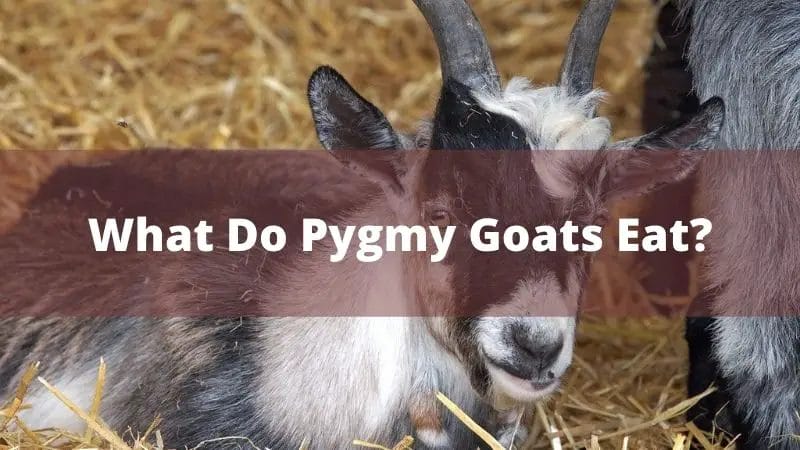Wondering what do pygmy goats eat? If so, you are in the right place.
Pygmy goats are adorable and an excellent choice for small families or local farms. Besides, they have a simple feeding requirement. If you are looking for a guide on what you can feed them, then you are in the right place.
Pygmy goats rely on hay or grazing as their daily diet. However, they also like to eat fruits, veggies, leaves, and plants. However, they may require additional supplements to maintain good health.
In this article, I am going to share the food pygmy goats love to eat & need to feed, from my experience on raising them and in-depth research.
List of Food That Pygmy Goats Eats

Now let’s see the list of the feed that you can provide your pygmy goat. Here I have compiled a table for ease to understand. Below this section, you will find more information about the foods and minerals they need.
1. Pasture
The pygmy goats are ruminants they love grazing and browsing. In fact, fresh forages like grass and green plants can meet most of their daily feeding requirement.
Offering your pygmy goat access to grass is essential. Grass, bushes, leaves, and weeds including dandelions and clovers seem to be the goat’s common food source and would be greeted with open arms.
They love to eat
- Green grasses for goats are fescue, orchard grass, bluegrass.
- Forbs plants (herbaceous flowering plant) like cabages, clovers, sunflowers, daylilies, and even milkweeds when other food are onot avilable.
- The common browse they consume are brushes pigweed and horseweed, and vines oak, blackberry, rabbit brush, dock, multiflora rose, saplings, plantain, locust, briars, bramble, honeysuckle, sumac, privet, small deciduous, etc.
However, they prefer frobs and browse over grass and other foods. In fact, about 60% of their regular diet is frobs and browse plants.
2. Hay
The second most common pygmy goat feed is hay. Farmers often provide hay when goats are captive. In case of cold weather, hay can fill most of their diet. Each pygmy goat requires 0.5-1kg of hay each day. However, hay doesn’t have the nutrition value as pasture.
Choose high-quality hay for such healthiest goats and the best milk. High calcium alfalfa hay is essential for milk supply.
There are several types of hay that goats eat.
- Grass hay- It is cheap but lacks required vitamins. Thus only relying on grass hay may cause nutrients deficiency.
- Alfalfa hay – This kind of hays are recommanded for all kind of ruminant animals. If you don’t have enough area for your pygmy goats to graze, you may give them alfalfa hay instead.
4. Grain
Grains are essential for fattening up your goats. My goat love crushed corn, oats, barley, or milo. Besides, ‘you can also choose to feed commercial grain feed.
The best types of grain for Pygmy goats should be easily digestible wheat, barley, and oats. If you are into goat farming, I will recommend making your own grain. This way you can control the quality and save money.
As grains are good energy sources, it’s worth taking these initiatives. On the other hand, if you are buying grains or pallets from stores, make sure that it’s easily digestible and healthy. Also, don’t provide regular sheep feeds to your pygmy goats.
Now, baby pygmy goats can also eat grains, however, farmers recommend hay pellets instead.
4. Vegetables and Treats
Vegetables and fruits are nutritious for pygmy goats and appreciated as a delicious meal.
Watermelon, apples, pears, peaches, carrots, lettuce, celery, pumpkin, squash, and spinach are examples of human foods that may be fed to your pygmy goats.
Just keep in mind that all of the slices are tiny enough to avoid choking. Avocado is extremely toxic to goats and therefore should be avoided.
4. Water
As with other animals, water is essential. Pygmy goats require seven to eight liters of water per day.
They love clean and editable drinking waters. You have to make sure clean water and monitor their drinking habit.
The common problem that pet goat owners face is – goats are not drinking enough water. This is because they don’t like the water that you’re giving them.
Goats require water to survive in a good manner. Goats, like other creatures, require water to thrive. Furthermore, water is an extremely vital element for goats since they are grazers and require more water to metabolize their meal in comparison to some other animals.
As a result, keep in mind that your pygmy goats have access to adequate fresh water all the time. Ensure to replace the water more often. Moreover, remember to clean the water tank or container on a continuous basis.
What do Baby Pygmy Goats eat?
Now, the kids require special care. Besides, when it comes to feeding these cute kids there are some basics that you need to understand.
Adult pygmy goats have a stomach, composed of four compartments – rumen, reticulum, omasum, and abomasum. However, it tasks about 60-70 days for the rumen to fully develop.
At that age, they can eat Milk and leafy hay.
When they are about 3 months old you can provide a small amount of grass, hay, and crushed grains.
Required Tools and Equipments for Feeding
They are ideal for micro-level farming in urban and suburban locations. Besides, Pygmy goats are also quite sociable and docile, hence they can be permitted to stay out of their fence to graze grass, bushes, weeds, leaves, and so on. They are energetic and amusing, and if you put difficulties in their living area, they will keep you entertained for hours.
Here are some tools that can ease raising pygmy goats.
Hay feeder
While feeding alfalfa and other such hays to your pygmy goats, one should use a hay feeder to maintain the hay off the ground in a proper way. It is important because goats are picky eaters. If the food falls on the ground and they kick upon that, then they won’t even eat it.
The pygmy goats are only around 50cm tall, so you’ll need a hay feeder that’s the right size for them. Whenever they can’t access the food, they won’t be able to eat it. As a result, the feed portion of the hay feeder should always be less than two feet higher from the surface level of the ground.
Besides, a hay feeder having bars is an excellent option. The hay feeder is shaped like a V, and you fill it with hay so that they may draw it through the holes.
Cereals
Cereals can be used to augment goat food. Pygmy goats, like other goats, require additional food in the winter. In fact, even in the heat, milking goats and young goats require cereal supplements.
Oats, maize, and barley are the three major grains suited for pygmy goats. Cereals could also be used to enhance the diet of pygmy goats.
Maintaining the Health of Pygmy Goats

If your goat is not getting proper nutrition from its daily diet, supplements can be a lifesaver. Here, I have described the most important supplements that they may require.
Note: Contact a veteran before providing any supplements.
Vitamin A
Vitamin A is necessary for the health of pygmy goats. They obtain this vitamin through alfalfa or grazing most of the time. If none of these options are available, give them maize or corn.
Vitamin D
It helps goats absorb calcium, which keeps their bones strong, just like it does in the case of the human body. Moreover, Sunlight will help your goats obtain vitamin D if they pass a good deal of time outside. Offer them sun-dried alfalfa instead if they don’t get enough sunshine. Minerals should be given to grazing goats.
If the pygmy goats are grazing (rather than eating hay and grains), feed them a mixture of iodized salt, crushed limestone, and animal bones (steamed and powdered). You may store this combination in a different and separate bucket and feed it to the goats as required.
Give them selenium injections
Selenium is a vital micronutrient, but it is much more essential if you live in a region where white muscle disease is prevalent because selenium safeguards against it. In addition, you may inject selenium into the baby goats once they are born.
Vaccinate your goats once in a year
At the very least, your goat should be immunized against enterotoxaemia and tetanus. Your veterinarian can help you with this. Just reach them whenever you have any queries regarding vaccination doses.
Your veterinarian may help you with this. You must also inquire about rabies vaccination with your physician. Get your goats examined at least once a year to ensure that their vaccinations are constantly updated and that they are healthy.
Final Thought
Pygmy goats make fascinating and entertaining companions, but they often necessitate a huge amount of time and attention. They may survive for up to 15 years, making them a long-term investment.
I hope, this article answers all your questions about what your pygmy goats eat and drink. To learn more about goat feed, read our article on what goat eats.
Now, if you have any questions please let me know by commenting below.
I will also appreciate it if you share your experience with our lovely goat with the farming method team.
